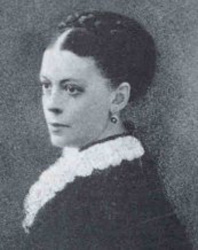Our beautiful flags are nearly done and are to be presented to the Second Regiment before they leave. The regimental banner is worked with the arms of the state, which are far more beautiful than those of any other state, with a heavy wreath of palm worked in gold-colored silk around the shield and mounted on a staff headed with a battle-axe and spear plated with gold. Won’t it be beautiful? The other flag is the Union flag and just as handsome in its way. F. B. was here last night with stripes on his trousers, but wisely withholding the full splendors of his “milingtary” attire until we become gradually accustomed to it. He looked very handsome and is as coolly delighted at the chance of a little fighting as anyone I have seen. We are both highly entertained just now by the pertinacity with which our friends here persist in engaging us to each other. I was telling him last night of a lady who called the other day and would not listen to any denials on my part, asseverating that Miss _________ assured her that she knew it to be a fact; whereon Frank, putting himself in an attitude, informed me that “being on the eve of battle and about risking his life in his country’s defence, he could not feel that it was his duty to engage the affections of any young and lovely female and withdraw her from the bosom of her own family,” whereon I begged him not to apologize, and explained that “being on the point of joining the Nightingale Regiment and putting myself in the way of catching a fever, I could not feel justified in allowing my naturally susceptible feelings to run away with me,” etc. I don’t know why I Jell you all this stuff –only it makes you laugh a little. . . .
Later.– Dora and I went up at four o’clock to see our flags given to the Second Regiment, on their way to the “Cahawba,” which waited to carry them off, no one knows where, under sealed orders, –but probably to Washington or Fortress Monroe. The colors were presented on the Green at the foot of the liberty pole, where the Home Guard formed a hollow square enclosing all the ladies who had worked on or were interested in the flags, and when the regiment marched up they took their places inside the square, which widened and kept off the crowd outside. Two pretty girls held the flags, assisted by two gentlemen. Mr. Foster made a short and spirited address to the regiment, and their Colonel replied in a few brave words, and then Dr. Leonard Bacon read the twentieth Psalm, “in the name of our God we will set up our banners,” etc., and made a beautiful prayer, and amid the shouts and cheers of the crowd, the frantic waving of handkerchiefs and flags and the quiet weeping of some who were sending off their dearest ones to all the chances of war, the glittering waving splendors were lifted aloft and the regiment swept on– carrying in its ranks Frank, who found time in the midst of the confusion to ride his horse round to the place where we stood, and hold my hand tenderly for two or three minutes while he whispered some good-bye words, especially his “farewells to Miss Georgy,” greatly to the satisfaction of some old ladies near, who, fondly fancying that I am engaged to him, probably wondered at my comparative composure. Yes! the good-byes are hard enough even if it is for the country, and I have had a heartache all day at the thought that I shall see the dear fellow no more for so long a time, and of how much we shall all miss him. He looked tired, with these last days of hurry. We stood two hours nearly, on the Green. We heard all about the doings in Norwich from Captain Chester and Lieutenant Coit of the “Buckingham Rifles.” They are both pleasant young fellows, and we made their acquaintance while sewing green stripes on the trousers of the company and brass buttons on their coats – the very garments which were made on Sunday by the Norwich ladies. It was funny work, as the men all had to be sent to bed before we could be put in possession of their apparel, and the officers being in the same quandary all were comfortably tucked up in their quarters and their trousers under way when sixteen Norwich gentlemen called to see them, and had to be received by them “lying in state!”
